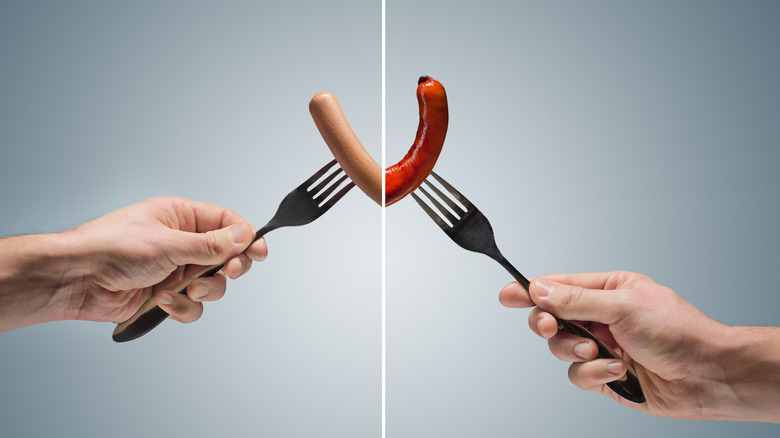You Should Definitely Be Seasoning Your Hot Dogs
When we think of summer cookouts, two classic dishes come to mind — hamburgers and hot dogs. The burgers get treated with great care, seasoned just right and grilled to perfection, but the dogs get tossed onto the grill without a second thought. Sure, afterward they get loaded up with as many fixings as the bun will allow, but aren't franks as important as burgers, and just as worthy as some prep work? We think so.
Of course, spices are added into the meat of hot dogs when they're made, but the seasonings are generally pretty mild as they are meant to have a broad appeal and not clash with whatever toppings folks prefer. If you plan on boiling or steaming your weenies, you'll have to be content with the seasonings inside. However, if you are grilling them or cooking them on the stove, you have an opportunity to take your hot dogs to the next level by caring for them as you would a hamburger.
Seasoning a frankfurter isn't quite the same as seasoning a beef patty. Factoring in the outer casing of the hot dog, you will have to approach seasoning them with some forethought.
Cut and marinate your dogs
Because the casing of a hot dog makes it nearly impossible to sprinkle on spices that will stick to the meat, marinating it is the first action to take when leveling up a dog. A marinade will also have some difficulty attaching to the outer casing, but you can help it seep in by cutting small slits down them crossways.
The marinade will flavor the inside, and as the hot dog cooks, the areas around the cuts you made will char, adding a crispy texture on the outside. They only need to soak up the marinade for 15 to 20 minutes, but they can also be left bathing overnight in the fridge for some additional flavor.
Look to the condiments that would normally accompany your hot dogs for inspiration on what to season them with. You can mimic the flavor of mustard by mixing mustard seeds, turmeric, and vinegar into a paste for marinating, and adding onion powder to the mix will lend it a bitter herb taste that will pair nicely with a savory footlong.
Once marinated, you can then get dry spices to stick to the outside by taking your steeped weenies and rolling them in a small tray with spices like steak seasoning or — for a truly hot dog — chili powder.
The type of hot dogs you buy matters
You can season your franks with anything that excites your tastebuds, but you may also want to consider what kind of meat is inside and how the natural flavor will complement your seasonings of choice.
Pork hot dogs generally possess a mellow, sweet flavor profile, which would pair well with a mild Italian dressing and a mix of fresh herbs like oregano and thyme. You could also go the sweet and spicy route by creating a marinade with paprika, cayenne pepper, and brown sugar. If you really want to work outside the box, think about seasoning pork dogs with citrus zest such as orange or lime.
Beef hot dogs, on the other hand, showcase a heartier meat flavor that would welcome seasonings like cumin, coriander, and garlic. Starting with a mix of Worcestershire sauce, mustard, and chili sauce, marinate the weenies as normal, then roll them in a blend of garlic, cumin, coriander, and black pepper. The marinade will bring the savory flavor of the beef while adding a pleasant smokey essence, and the dry spices will accent the gusto the marinade lends to the beef.
Any seasoned frankfurter can still be loaded up with the usual fixings, but instead of a boring weenie underneath it all, you will be treated to a hot dog worthy of being a staple summer dish.


